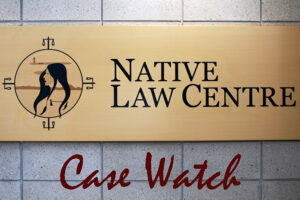Motion dismissed. The Applicant failed to demonstrate he would suffer irreparable harm if a First Nation election proceeded, as he can pursue an adequate remedy for his complaint before the First Nation’s Appeal Board.
A general election for the Conseil des Atikamekw d’Opitciwan was called for September 10, 2019. The elections are governed by an electoral code, where along with other conditions, all candidates must be ordinarily resident in Opitciwan. The Applicant was nominated for the position of Chief, but the Electoral Officer withdrew the name from the ballot because the Applicant does not reside in the community. The Applicant seeks an interlocutory injunction so that his name remains on the list of candidates. He submits that the residency requirement is invalid, discriminatory and contrary to the Charter. After he brought an application for judicial review of the Electoral Officer’s decision, the Applicant subsequently brought this motion for an interlocutory injunction. Despite a strong case shown on the merits, the Applicant has failed to demonstrate that he would suffer irreparable harm if his motion was not granted. There is an adequate remedy before the Opitciwan First Nation Appeal Board that would allow him to raise his Charter claims.
An interlocutory injunction is a temporary measure intended to preserve the rights of the parties until a decision is rendered on the merits but it is not a final resolution of the case. This takes into account that such motions must often be decided on the basis of an incomplete evidentiary record and that a final resolution cannot be reached in a short time frame (Manitoba (AG) v Metropolitan Stores Ltd, [1987] 1 SCR 110; RJR–MacDonald Inc v Canada (AG), [1994] 1 SCR 311 [“RJR”], and Harper v Canada (AG), 2000 SCC 57).
The first stage of a three part test requires the applicant to demonstrate a serious question to be tried, meaning neither frivolous nor vexatious. At the second stage, the Applicant must convince the court that irreparable harm would be suffered if an injunction is refused. The third stage of the test requires an assessment of the balance of convenience to identify the party that would suffer the greater harm from the interlocutory injunction, pending a decision on the merits. (R v Canadian Broadcasting Corp, 2018 SCC 5 [“CBC”]) It should not be believed in this highly contextualized and fact dependent framework, that the three components of this framework are completely independent of each other (Mosaic Potash Esterhazy Limited Partnership v Potash Corporation of SK Inc, 2011 SKCA 120).
This Court often hears motions for interlocutory injunctions in First Nations governance matters. The court’s discretion should be guided by the principle of self-government, and assess whether the various courses of action would facilitate decision-making by the First Nation itself (Gadwa v Joly, 2018 FC 568). Unlike a prohibitive injunction that has a relatively low threshold (RJR), a mandatory injunction directs the defendant to undertake a positive course of action. In these instances, a “strong prima facie case” is required. Upon a preliminary review of the application, the court must be satisfied that there is a strong likelihood that the applicant at trial will be successful in proving the allegations set out in the originating notice (CBC).
In this matter, the Applicant is not seeking to prevent the election from being held, but an order to include his name in the list of candidates. In certain cases, the result of the interlocutory motion will in effect amount to a final determination of the action, thereby, a more extensive review of the merits of the case must be undertaken (RJR). When the judge hearing the merits of the case cannot undo what was done at the interlocutory stage, a strong prima facie case must be established. If the injunction is granted, the election would be conducted with ballots that include the Applicant’s name, therefore he will have obtained what he wants, making it difficult to see how a hearing on the merits would be useful (Toronto (City) v Ontario (AG), 2018 ONCA 761).
The Applicant has demonstrated the existence of a serious question to be tried, but not a strong prima facie case. The trial judge dealing with this matter will assess the evidence presented to the court and come to the appropriate conclusions. Harm is by definition reparable if there is recourse that makes it possible to vindicate the underlying right and that provides adequate remedies. The doctrine of exhaustion of remedies requires that an applicant pursue all adequate administrative remedies available to them prior to applying for judicial review. This doctrine improves respect for self-government, as it ensures that governance disputes are first dealt with by Indigenous decision-making processes (Whalen v Fort McMurray No 468 First Nation, 2019 FC 732).
The Election Code provides for the establishment of an appeal committee. Upon receipt of a complaint, the appeal committee conducts an investigation and, if founded, they may take all necessary measures, including ordering a new election. The Applicant could file a complaint on the basis that the rejection of his nomination was in violation of the Charter. The Election Code also provides that any person whose nomination is withdrawn by the Electoral Officer may immediately bring that decision to the appeal committee which the Applicant could have done. The Court therefore concludes that the Applicant has a recourse that will allow him to put forward his Charter arguments and that he did not demonstrate irreparable harm. There was no need to fully address the balance of convenience.


